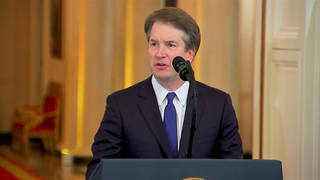
Guests
- Eric LiptonPulitzer Prize-winning investigative reporter at The New York Times. His recent piece is headlined “In Gorsuch, Conservative Activist Sees Test Case for Reshaping the Judiciary.” Lipton has reported extensively on the Trump administration.
All eyes are on the Supreme Court nomination of Neil Gorsuch, who is facing his second day of confirmation hearings. But Trump has 123 other federal judgeships to fill, because Senate Republicans blocked many of Obama’s nominees. We take a look at how a top official at the Federalist Society, named Leonard Leo, is playing a key role in helping Trump reshape the nation’s judicial landscape from behind the scenes. We speak with Pulitzer Prize-winning journalist Eric Lipton of The New York Times. He recently co-wrote a piece headlined “In Gorsuch, Conservative Activist Sees Test Case for Reshaping the Judiciary.”
Transcript
JUAN GONZÁLEZ: As we continue our coverage of Supreme Court nominee Neil Gorsuch, we are joined by the Pulitzer Prize-winning journalist Eric Lipton of The New York Times. He recently co-wrote a piece headlined “In Gorsuch, Conservative Activist Sees Test Case for Reshaping the Judiciary.” The piece looks at how a top official at the Federalist Society, named Leonard Leo, is playing a key role in helping Trump behind the scenes.
AMY GOODMAN: Leonard Leo is currently on leave from the Federalist Society to help shepherd Gorsuch’s nomination. In addition to nominating Gorsuch to the Supreme Court, President Trump has 123 other federal judgeships to fill, because Senate Republicans blocked many of Obama’s nominees.
Eric Lipton, welcome to Democracy Now! Why don’t you start off by talking about the conservative shaping of the judiciary, and particularly the role of the Federalist Society?
ERIC LIPTON: Sure. You know, first off, I mean, you introduced them at one point by describing them as a right-wing group. I wouldn’t call the Federalist Society a right-wing group. I think that they are a group of conservative legal scholars who see themselves as an alternative voice, and they really got started through law schools in the United States, where there was some concern by law professors that there was not a forum for conservative people to sort of, you know, meet and discuss theories relative to the court that could sort of be an alternative to the more liberal, dominant thought in the court system.
But the Federalist Society has grown into an organization that has an incredible influence in the United States. It is—it has many lawyers who are lawyers working for different corporations, and it has judges that are members. And it has gatherings around the United States that pull together conservative legal minds. And it’s funded by a combination of conservative foundations, that are—you know, that want to try to change various standards in American society, as well as corporations that like the ideas of the Federalist Society in terms of limited governing and sort of trying to knock down certain federal regulations.
So, what—the thing that is sort of interesting at this moment is that—is that the judicial philosophy of the Federalist Society and of groups that are related to it in the conservative world, they are better positioned at this moment than they probably have ever been in modern times, and because of a series of events that have occurred. You’ve got the president, who has essentially allowed them to help pick Supreme Court nominees, and told them that he’s going to also allow them to provide input to other judges. You’ve got a Congress that is controlled by Republicans. You have state governments throughout the United States where the majority of the governors and legislatures are under Republican control. And you have more vacancies right now, going into this new term for a president, than you’ve had in any time going back to Carter. And also, you have more judges who are near retirement age than in any time in decades. So, President Trump and the Republicans are better positioned at this moment to reshape both the federal and state judiciaries than they probably have ever been. And the Federalist Society and Leonard Leo are sitting there ready to help that process.
AMY GOODMAN: And can you talk about the foundations that are supporting the Federalist Society, like the Koch brothers, like Richard Mellon Scaife?
ERIC LIPTON: Yes. I mean, they—you know, you’ve got everything from Google and Microsoft, which are donors to the Federalist Society, and as well as major energy companies like Chevron or Devon, which are very—you know, especially Devon is trying to challenge much of the Obama administration’s regulatory agenda when it comes to the environment. But then you have also a lot of very conservative family foundations that—you know, like the Mercer foundation or the Koch brothers’ foundation, that see their giving, if you look at their donor patterns, as a way to try to influence American society. And clearly, I mean, the Federalist Society is a forum for these lawyers to discuss legal approaches that they can then use and to fine-tune them. And they—the Federalist Society argues that it is a nonpartisan 501(c)(3) that doesn’t—you know, is not an advocacy organization. But it’s pretty clear that they have a very conservative legal philosophy, when you look at the forums that they hold and the debates that they hold and the people that are members of it, and you look at the judges that they also align themselves with. And, I mean, Leonard is almost—has a mythical status almost in the legal circles in the United States. I mean, you come to an event in Washington that the Federalist Society puts on and that Leonard Leo is helping organize, and you’re likely to encounter, you know, at least when Judge Scalia was alive, I mean, Judge Scalia, Judge Thomas. I mean, he is very well respected among that circle and has a great deal of influence.
JUAN GONZÁLEZ: And how did he get to have this influence? He’s almost like the go-to guy. He also shepherded through, apparently, the confirmations of both Justice Roberts and Justice Samuel Alito, as well. How did he get to that position?
ERIC LIPTON: I mean, the Federalist Society is essentially—I mean, a fraternity implies that it’s male, but a fraternity—you know, could be, say, sorority—of like-minded lawyers. It’s a club. And so, it’s essentially a private club of like-minded lawyers, and be they judges or corporate lawyers or academic lawyers. And they have regular meetings and conferences. And Leonard Leo is sort of like the—you know, the head counselor of this group. And they very well—he’s a very respected guy. He’s a very intelligent guy. He’s also, surprisingly for Washington, very low-key. You don’t hear his voice in the debates at all. You don’t see him. You don’t see him quoted. He’s very much behind the scenes, but has a great deal of respect among this universe of folks.
He really came to prominence, at first, in George W. Bush’s administration, when he was named to serve as a sort of intermediary for Catholics and the Republican Party. And he, himself, is Catholic and very serious about his beliefs. And then, during—he transitioned from that role to—early in the Bush administration, they had trouble getting through some Supreme Court nominees, and Harriet Miers was nominated and then backed out. And there was frustration among conservatives that Bush was not taking advantage of the power that he had to fill the federal courts. So, Leonard came in, and—Leonard Leo, and he helped—he helped set up a process to not only identify candidates that were conservative and that they could get confirmed, but also a process to then build public support across the United States to execute on those nominations once they were made. So that’s when Judicial Crisis—or then called Judicial Confirmation—Network was created. Leonard Leo has always been associated with this group. He helps find them money. And they began a public relations campaign nationally to get the conservative judges confirmed, once, you know, folks like Leonard had helped get them nominated.
AMY GOODMAN: You begin your piece, Eric, the front-page piece of the Sunday New York Times, by saying, “Deep into the Senate’s 68-page questionnaire of Judge [Neil M.] Gorsuch, the Supreme Court nominee was asked to describe how he had come to President Trump’s attention.” And he said—”The first thing he wrote was, 'I was contacted by Leonard Leo.'” So, can you also talk, as you are now, talking about the allied organizations and those that Leonard Leo works with, like John Malcolm of the Heritage Foundation, Ann Corkery, the Washington lawyer who, along with her husband, oversees the Judicial Crisis Network and, you say, related dark-money groups that also support the cause?
ERIC LIPTON: Yeah, I mean, I, as a reporter and as a person that believes in transparency and also likes—someone that likes to kind of, you know, to decipher riddles, I find it really interesting to just observe this kind of aligned parties and the various roles that they have set up. So you have, you know, the Federalist Society and Leonard that’s playing a role in helping identify candidates to nominate and to bring them to the administration and to get the process started. And then you essentially have a handoff, because he is a 501(c)(3). You know, he comes from that world, where you’re not advocates. Then you have his handoff to this group, the Judicial Crisis Network, which is an advocacy organization that’s spending, you know, something upwards of $4 million on television commercials and radio and other media, particularly in the states where there are Senate Democrats who are up for re-election next year in states where Trump won. OK, so these are Democrats that live in red states who are vulnerable. And Gorsuch is going to need their votes in order to get confirmed, because, otherwise—unless, you know, the 60-vote rule is overturned, in order to get—you know, to prevent the block. You know, he doesn’t need it for a majority; he needs it to get the vote to the floor.
And so, that’s where Judicial Crisis Network comes in. This is an organization that was set up in approximately 2005, and it’s a dark-money group. They will not tell you who their donors are. But when you look at their—at their 990, which is their tax form—and I happen to conveniently have a copy here, and the thing that’s so interesting about it to me is that, you know, they show that they had a budget of—in 2014, of $5.7 million, which isn’t that much, but that’s just one of many aligned organizations. And then you go to the page that shows who their donors are, and it’s called the Schedule B of the 990. And if you ask for it, you can get it, although if you look in the normal tax records, you won’t find it. And you see that all of their money came from two donors, although the names of the donors aren’t there. So, you know, $5.75 million came from two people. And then you look at their 990, as well, and say, “Well, OK, how many people do you have that work for you? How many volunteers do you have?” Zero employees, zero volunteers. So you’re sort of wondering, “Well, what is this group?” I mean, it has zero employees, zero volunteers. All of its money come from two donations. So how much is this really a grassroots organization, or how much is it an organization that takes checks from players that want to influence the federal judiciary and then funnel the money through this organization to try to create an appearance that it’s really a grassroots organization? And that’s something that—
AMY GOODMAN: And do you know who those two people are?
ERIC LIPTON: Well, if you reverse-engineer the federal—the IRS records, which I did, you could find—you could backwards—you could find this organization called the Wellspring Committee. OK, so here’s the interesting thing. The Wellspring Committee, which is also—it’s based in Virginia, is run—and here, the signed document, Wellspring, this is their 990, is Ann Corkery. OK, so Ann Corkery is listed, signed here as the president of the Wellspring Committee. OK, on the Judicial Crisis Network, this document, who signs it as a treasurer? Neil Corkery. That’s her husband. OK, so her husband helps run the Judicial Crisis Network. Ann Corkery runs Wellspring Committee. And then you look at the back of their Schedule—who do they give—who does the Wellspring Committee give money to? Oh, so they gave $5.775 million to the Judicial Crisis Network in 2014. Wait a second, that’s exactly the same amount of the money that the Judicial Crisis Network spent in 2014. So, this—Ann Corkery gave all of the money to—and so then you wonder, “OK, where does Wellspring get its money from?”
Well, then you begin this process, because of the—you know, the federal government doesn’t require disclosure of donors. You end up into a brick wall, because you can’t find out Wellspring—where Wellspring Committee gets its money from, and you end up in the dark-money circle. But, basically, what you see is that this is an interconnected network that is moving money around in a way to try to hide who the original donors were. And then it’s—and the connections between the Federalist Society and the Judicial Crisis Network and Ann Corkery and Neil Corkery and Leonard Leo, and the connection between Judicial Crisis Network and the Wellspring Committee, they’re all interconnected. And now, I mean, they have their—they certainly have the right to influence this process. I mean, it’s a democracy. You raise money, you spend money. I just think it’s interesting to bring light to this and to sort of—to examine this network. And, you know, that’s their right to do it, and they’re doing it. But I think, you know—
JUAN GONZÁLEZ: Well, Eric Lipton, I’d like to ask you—obviously, they’re now using this entire machinery to help get Judge Gorsuch approved for the Supreme Court. But I wanted to ask you about the article you wrote, “Leashes Come Off Wall Street, Gun Sellers, Polluters and More.” The potential impact of Judge Gorsuch’s views on federal regulatory policy in terms of how he might shift the court in this direction?
ERIC LIPTON: Yeah, I mean, you know, I’d say, to me, forgetting all the tweets and the kind of the headlines that Trump has generated so far in his administration, there’s two really big things that are happening. OK, and I’m sorry, I have one more caveat: besides the immigration fight. And those are regulatory policy, which there are major things happening on the regulatory policy front, and then the judicial. You know, we’re only—Gorsuch is only the start. But, you know, as you said, there are 124 vacancies. So there is some major stuff that’s about to happen.
OK, so on the regulatory policy, Gorsuch, you know, is—it’s going to be interesting to watch. I mean, this is a guy who, in terms of the famous Chevron deference decision, you know, took a position opposed to Chevron deference, which allows that federal agencies have the right to interpret the law in a way to then write a regulation that offers, essentially, their interpretation. And Chevron deference, the court ruled that they have the right to do that. And he has found—he has ruled against that. And that is like a fundamental ruling that really shapes the powers of federal agencies to interpret the actions by Congress and to, therefore, build off of that legal action. And if Chevron deference is overturned, then we’re going to have a very different regulatory system in the United States.
And that—and, OK, you look at—if you want sort of to further that answer, you look at Judicial Crisis Network. Who—in addition to spending millions of dollars on ads to get Gorsuch confirmed, what else is Judicial Crisis Network spending a lot of money on? It’s spending millions of dollars to get Republicans elected as state attorneys general. And the reason that is, is they want Republican attorneys general to bring cases in state and federal court that challenge federal regulations, which they think are overreaching, and then to get those cases into the court, in which they then help pick the judges and have more conservative judges, and then will have decisions which limit the federal powers.
And I think that, you know, that Gorsuch is—if you look at his record, it’s reasonable to expect that he will—he will believe in a more—a narrow interpretation of the law and that any time that a federal agency goes too far, that it’s appropriate for the courts to review it and decide if it has stepped beyond its bounds. Now, I guess, you know, it’s going to be interesting to watch. But that said, we’re going back to a 5-4 court, which is where it was before. So, you know, is it going to be that radically different from the court we had before Justice Scalia died? Probably not.
AMY GOODMAN: In your piece on conservatives using the Gorsuch nomination to press overhaul in judiciary, you mention an attorney general—well, a past one—the Oklahoma Attorney General Scott Pruitt, who’s now head of the EPA. And you talk about how he sort of quipped that when—when Leonard Leo calls, you answer. And he invited him to dinner in Washington, and so Scott Pruitt stayed. And you talk about who was at that dinner.
ERIC LIPTON: Yeah, it just, again, shows you just what incredible status that Leonard Leo has. And so, Scott Pruitt was in town for a Federalist Society meeting. Scott Pruitt is very active in the Federalist Society. These are people with like-minded philosophies about the benefits of limited government. And so, Leonard asked—approached Scott and said, “You know, Scott, stay over Friday night for dinner. I think you’ll enjoy it.” And so, Scott Pruitt shows up for the dinner. It’s in a basement, which is sort of interesting. They don’t specify why the dinner was held in a basement location in Washington, D.C. And who’s there at the dinner table but Justice Scalia and Justice Thomas. So these are the kind of folks that when, you know, Leonard Leo has a Friday night dinner and he invites the attorney general from Oklahoma to join him, that these are the folks that he has around the table.
And one of the interesting things is, this little anecdote, which Scott Pruitt mentioned in a speech that he gave in Michigan last year—this anecdote came up during Scott Pruitt’s confirmation hearing, because this moment occurred at the time when Scott Pruitt was attorney general, and he had a number of cases in federal court, including several that had reached the Supreme Court. And so, you’ve got to wonder—I mean, here it is, the attorney general of Oklahoma with a number of matters that are pending before the Supreme Court—is it appropriate for him to be having private conversations in a dinner in an undisclosed location with two members of the Supreme Court? Pruitt was asked about that in the questions that were—written questions that were presented to him during his confirmation. And he said that he doesn’t remember the specifics of what was discussed, but he’s certain that he did not discuss pending court matters. But again, it just sort of shows you Leonard Leo’s really pretty unprecedented and underappreciated reach in conservative legal worlds in the United States, that he could bring together the attorney general of Oklahoma and two sitting members of the United States Supreme Court for a dinner.
AMY GOODMAN: Eric Lipton, we’re going to ask you to stay with us, Pulitzer Prize-winning investigative reporter at The New York Times. And we’ll link to your piece, “In Gorsuch, Conservative Activist Sees Test Case for Reshaping the Judiciary.” You’ve also written about what’s going on right now around FBI Director James Comey and other issues. And we’d like you to stay with us when we talk about this extraordinary moment yesterday when the director of the FBI, James Comey, revealed the agency is investigating links between the Trump campaign and Russia. Stay with us.












Media Options